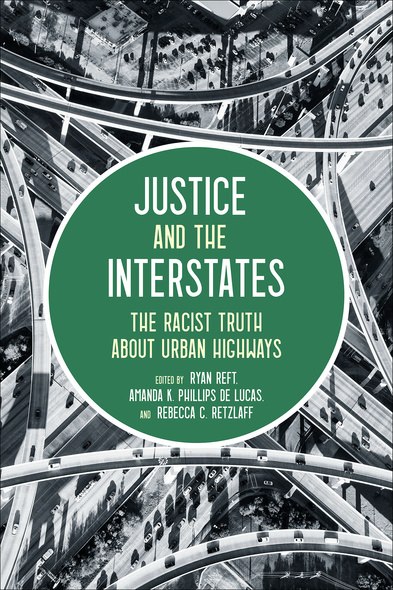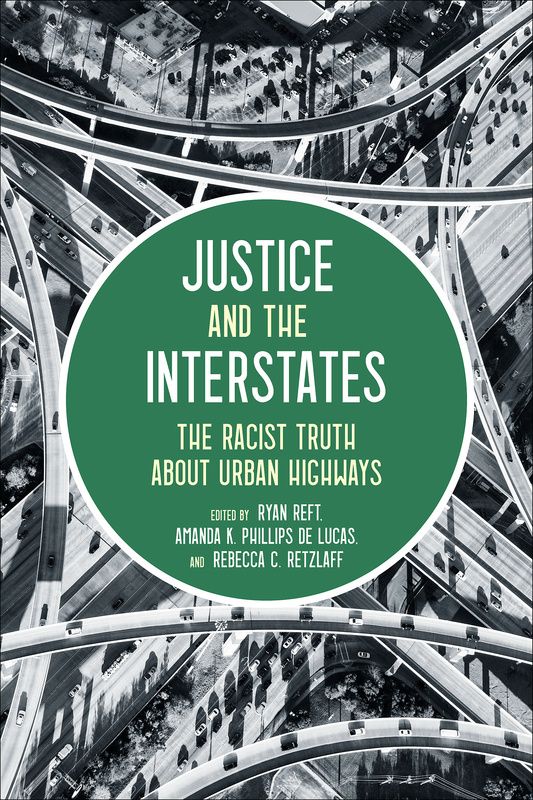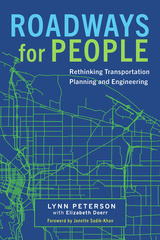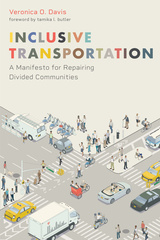
254 pages, 6 x 9
35 photos and illustrations
Paperback
Release Date:31 Jan 2023
ISBN:9781642832617
Justice and the Interstates
The Racist Truth about Urban Highways
Island Press
When the U.S. interstate system was constructed, spurred by the Federal Aid Highway Act of 1956, many highways were purposefully routed through Black, Brown, and poor communities. These neighborhoods were destroyed, isolated from the rest of the city, or left to deteriorate over time.
Edited by Ryan Reft, Amanda Phillips de Lucas, and Rebecca Retzlaff, Justice and the Interstates examines the toll that the construction of the U.S. Interstate Highway System has taken on vulnerable communities over the past seven decades, details efforts to restore these often- segregated communities, and makes recommendations for moving forward. It opens up new areas for historical inquiry, while also calling on engineers, urban planners, transportation professionals, and policymakers to account for the legacies of their practices.
The chapters, written by diverse experts and thought leaders, look at different topics related to justice and the highway system, including:
Edited by Ryan Reft, Amanda Phillips de Lucas, and Rebecca Retzlaff, Justice and the Interstates examines the toll that the construction of the U.S. Interstate Highway System has taken on vulnerable communities over the past seven decades, details efforts to restore these often- segregated communities, and makes recommendations for moving forward. It opens up new areas for historical inquiry, while also calling on engineers, urban planners, transportation professionals, and policymakers to account for the legacies of their practices.
The chapters, written by diverse experts and thought leaders, look at different topics related to justice and the highway system, including:
- A history of how White supremacists used interstate highway routing in Alabama to disrupt the civil rights movement
- The impact of the highway in the Bronzeville area of Milwaukee
- How the East Los Angeles Interchange disrupted Eastside communities and displaced countless Latino households
- Efforts to restore the Rondo neighborhood of St. Paul
[Justice and the Interstates], at once shocking and unsurprising, offers fresh and readable insights into the racism built into American cities and why building a more just society may require tearing down some highways….The book’s contribution is unique and valuable, blending racial justice advocacy, scholarly analysis, and visionary creativity.
This collection of essays challenges us to confront the history of politics and race that built America’s highways. Justice and the Interstates is a must-read for government officials, transportation policymakers, scholars, and anyone who travels in a car — that is, everybody.
'American highways were too often built through Black neighborhoods on purpose,' transportation secretary Pete Buttigieg tweeted in 2021. In deeply researched and carefully crafted case studies, the talented contributors to this impressive volume shine a bright light on the racialized politics that demolished businesses and homes and heaped another round of grime and noise on the nation’s poorest residents.
Ryan Reft is a historian of the Modern U.S. in the Manuscript Division at the Library of Congress. Since 2017, He has worked as senior co-editor of the Urban History Association’s blog, The Metropole.
Amanda Phillips de Lucas is a social scientist and environmental historian. She studies infrastructure, highways, environmental justice, and social movements.
Rebecca Retzlaff is a professor in the Community Planning Program and director of the Academic Sustainability Program at Auburn University. She formerly worked as a planner with the City of Detroit and in the Research Department of the American Planning Association.
Amanda Phillips de Lucas is a social scientist and environmental historian. She studies infrastructure, highways, environmental justice, and social movements.
Rebecca Retzlaff is a professor in the Community Planning Program and director of the Academic Sustainability Program at Auburn University. She formerly worked as a planner with the City of Detroit and in the Research Department of the American Planning Association.
Preface
Acknowledgments
Introduction
Part I: Mythologies
Chapter 1: The Myth and the Truth about Interstate Highways
Sarah Jo Peterson
Chapter 2: The Interstates, Racism, and the Need for Truth and Reconciliation: The Case of Highway Routing in Alabama
Rebecca Retzlaff and Jocelyn Zanzot
Chapter 3: Overton Park: The Race and Class Politics of Environmentalism, Historic Preservation, and Highway Construction
Ryan Reft
Part II: Methods
Chapter 4: Milwaukee’s Freeway Fights: Lessons from Building and Rebuilding
Ruben L. Anthony Jr. and Joseph Rodriguez
Chapter 5: The Perils of Civic Participation: Community Engagement and Interstate Planning in Baltimore
Amanda Phillips de Lucas
Chapter 6 Right in the Way: Generations of Highway Impacts in Houston
Kyle Shelton
Chapter 7: Latino Interchanges: Greater East Los Angeles in the Freeway Era
Gilbert Estrada and Jerry González
Part III: Momentum
Chapter 8: A Contemporary Path to Transportation Justice in Rondo
Tierra Bills
Chapter 9: Guerrilla in the Room
Amy Stelly
Conclusion: Never Again Is Now: The Transportation Professions’ Responsibility to Work Toward Justice
Steven Higashide
Notes
About the Contributors
Index
Acknowledgments
Introduction
Part I: Mythologies
Chapter 1: The Myth and the Truth about Interstate Highways
Sarah Jo Peterson
Chapter 2: The Interstates, Racism, and the Need for Truth and Reconciliation: The Case of Highway Routing in Alabama
Rebecca Retzlaff and Jocelyn Zanzot
Chapter 3: Overton Park: The Race and Class Politics of Environmentalism, Historic Preservation, and Highway Construction
Ryan Reft
Part II: Methods
Chapter 4: Milwaukee’s Freeway Fights: Lessons from Building and Rebuilding
Ruben L. Anthony Jr. and Joseph Rodriguez
Chapter 5: The Perils of Civic Participation: Community Engagement and Interstate Planning in Baltimore
Amanda Phillips de Lucas
Chapter 6 Right in the Way: Generations of Highway Impacts in Houston
Kyle Shelton
Chapter 7: Latino Interchanges: Greater East Los Angeles in the Freeway Era
Gilbert Estrada and Jerry González
Part III: Momentum
Chapter 8: A Contemporary Path to Transportation Justice in Rondo
Tierra Bills
Chapter 9: Guerrilla in the Room
Amy Stelly
Conclusion: Never Again Is Now: The Transportation Professions’ Responsibility to Work Toward Justice
Steven Higashide
Notes
About the Contributors
Index







